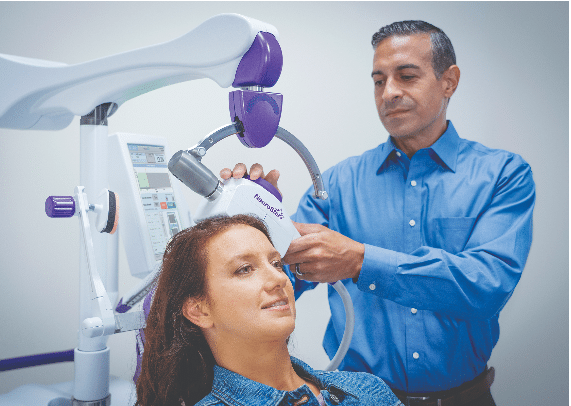Balancing Mind, Body, and Spirit for Complete Wellness
Optimizing Mental Health: A Holistic Approach
At Northern Medical Center, we believe that mental illness has a complex interplay between brain dysfunction and maladaptive coping behaviors. Our comprehensive model addresses the mind, body, and spirit, examining factors contributing to mental dysfunctions on multiple levels:
Integrative Therapy
The Mind-Body-Spirit Approach



Our center employs an integrative approach, combining various modalities and therapies to help patients enhance their functionality, reduce medication dependency, and regain their ability to live meaningful lives.
We seamlessly merge cutting-edge medical technologies such as transcranial magnetic stimulation (TMS) and neurofeedback (biofeedback) with time-honored healing practices like acupuncture, psychotherapy, advanced nutrient therapy, and functional medicine.
Advanced Nutrient Therapy
Targeting Biochemical Imbalances
Numerous common mental health conditions, including but not limited to depression, anxiety, bipolar disorder, schizophrenia, PTSD, autism, and ADHD, are associated with biochemical imbalances arising from a combination of genetic and environmental factors. Through the pinpointing and rectification of precise biochemical imbalances, our personalized Advanced Nutrient Therapy facilitates the natural enhancement of cognitive functions, resulting in the alleviation of symptoms.

Common Mental Health Conditions
What Is Depression?
Depression is a serious mental health condition. It can negatively affect the way you think, how you feel, and how you act. According to the World Health Organization, an estimated 3.8% of the population experience depression. Although depression is a common condition, it can feel isolating to struggle with it. Luckily there are effective ways to help treat it. Common symptoms of depression include:
- Constant feelings of sadness or a depressed mood
- Loss of interested in activites you once enjoyed
- Changes in your appetit
- Sudden weight loss or weight gain
- Insomnia
- Sleeping too much
- Loss of energy and increased fatigue
- Increase in pruposelessness
- Mindless physical activity
- Inability to complete simple, daily tasks
- Loss of energy or fatigue
- Feelings of worthlessness
- Difficulty concentrating
- Thoughts of death or suicide
What Is Obsessive Compulsive Disorder (OCD)?
Obsessive-compulsive disorder, or OCD, is one type of anxiety disorder that is characterized by frequent obsessions, repetitions, or ritualistic behaviors. Acting on these obsessions often provides people with OCD with feelings of relief and improvement from stress or anxiety. The Mental Health Foundation reports thatapproximately 2% of people are affected by OCD.
People with OCD may have anxieties about the following:
- Fear of contamination
- Fear of dirt
- Fear of danger occurring
- Excessive concern with exactness and perfection
- Beyond a normal focus on the need for orderliness
- Anxiety related to unwelcome thoughts that involve anger, sexual content, hurting others or oneself, and inappropriate public behavior
Compulsions in patients with OCD may include:
- Cleaning
- Repeatedly checking stoves, windows, or doors
- Washing
- Repeating words, numbers, prayers, or phrases
- Mental rituals
- Ordering or arranging things
What Is Anxiety?
Anxiety is known as an intense, persistent worry or fear about everyday situations or incidents that do not typically require excessive worry. People with anxiety disorders will often experience panic attacks characterized by the following symptoms:
- Fast heart rate
- Rapid breathing
- Sweating
- Inability to sleep or rest
- Difficulty breathing
- Fatigue and feelings of constant tiredness
What Is Post-Traumatic Stress Disorder?
Post-traumatic stress disorder, or PTSD, is a psychiatric disorder that occurs in people who have experienced or witnessed a traumatic event or set of circumstances. These events are often life-altering, either emotionally or physically. According to Psychiatry.org, PTSD affects approximately 3.5 percent of adults in the US each year. Examples of some traumatic experiences may include:
- Witnessing death
- Natural disasters
- Rape or sexual assault
- Historical trauma
- Intimate partner violence
- Bullying
- Terrorist acts
- War
People affected by PTSD may feel stressed, afraid, highly emotional, or in danger when reminded or triggered by a memory of their past traumatic experiences.
Can These Conditions Be Treated with Medication?
While medications do not cure mental health conditions, they can aid in helping to lessen the effects of symptoms on the body and your way of thinking. Some common medications used to treat mental health include:
- Sertraline
- SSRIs
- Beta-blockers
- Dosulepin
- Duloxetine
- Escitalopram
- Lamotrigine
- Mirtazapine
- Paroxetine
Are There Holistic Ways to Treat These Mental Health Conditions?
In addition to medications, or as alternatives to medication, there are several holistic ways that patients suffering from mental health symptoms can find relief.
Depression: Activities like exercise, acupuncture, healthy eating, taking vitamins, therapy, sleep, and quality time with friends and loved ones can help improve depression symptoms.
OCD: OCD can be treated with cognitive behavioral therapy (CBT) with exposure and response prevention (ERP). This involves working with your therapist to break down your problems into their separate parts, such as your thoughts, physical feelings, and actions.
Anxiety: Lifestyle changes such as getting more sleep, limiting caffeine and smoking, meditating, and physical activity can go a long way toward helping you manage anxiety symptoms. Support groups may also help people with anxiety find commonality with others.
PTSD: Meditation, balanced eating, physical activity, and journaling can help put PTSD at ease. However, therapy including Cognitive Behavioral Therapy, Cognitive Processing Therapy, Cognitive Therapy Prolonged Exposure, Brief Eclectic Psychotherapy, Eye Movement Desensitization and Reprocessing (EMDR) Therapy, and Narrative Exposure Therapy (NET) are also highly beneficial options for PTSD patients.
Schedule an Appointment
At Northern Medical Center, our team of board-certified doctors draws from decades of experience to help you get back to the lifestyle you deserve. Allow us to help support you in managing your mental health conditions. To schedule an appointment, click here or call (845) 800-5118 to reach our location in Middletown, NY.
